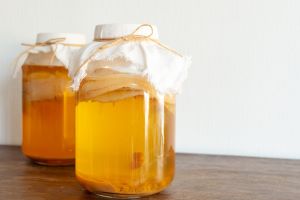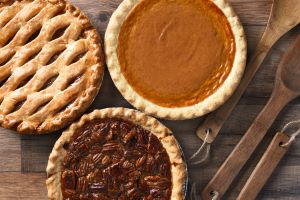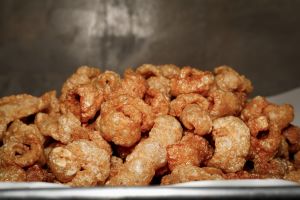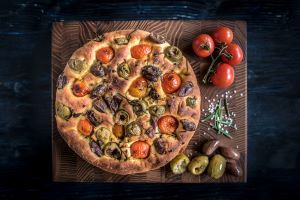Unique Foods Processed at Retail
Some food processes have additional risks to consider that can be easily overlooked. This page is designed to cover some common foods made in retail settings that do not require a Hazard Analysis Critical Control Point (HACCP) plan but have additional risks to consider.
Kombucha
Kombucha is a fermented tea. Although fermented foods such as yogurt and sauerkraut often require a HACCP plan in Minnesota, kombucha does not. This is because tea does not require refrigeration prior to the fermentation process being initiated. One concern is that during the fermentation process, kombucha produces alcohol. Kombucha is not considered an alcoholic beverage and therefore must contain less than 0.5% alcohol to be sold as a non-alcoholic beverage. Operators may need to have the final product evaluated to confirm the product is within the legal limits to be sold.
 Cold Brew Coffee
Cold Brew Coffee
Hot coffee brewing is generally safe because the process uses very hot water and only takes a few minutes, which prevents harmful bacteria from growing.
Cold brew coffee is different. It takes many hours to brew and usually does not use heat. Because of this, there isn’t enough research to show that cold brewing is always safe. Under the Minnesota Food Code, cold brew coffee is treated as a TCS food (time/temperature control for safety).
This means:
- Cold brew must be brewed and stored at 41°F or colder.
- It must be labeled with a 7-day date mark.
If a business wants to brew or store cold brew at room temperature or for longer than 7 days, they must submit a completed product assessment to the regulatory authority to show that their process is safe.
Which Pies Require Refrigeration?
It isn’t always clear if pies need to be refrigerated as some may not be safe if left out at room temperature. Pies prepared with refrigerated ingredients such as dairy and eggs, are higher in moisture content giving bacteria an ideal environment to grow. Refrigeration for safety is therefore necessary. Cream pies and custard pies, such as coconut, banana cream pie, or chocolate mousse pie must be refrigerated. Fruit pies such as apple, cherry, or blueberry can be safely stored at room temperature because the high acid content of the fruit and added sugar work together to limit the growth of harmful bacteria. Commercially purchased pies such as pumpkin pies can potentially be stored at room temperature if the manufacturer’s label and directions indicate that it is safe to do so. Pies prepared in-house that contain ingredients that are time/temperature control for safety foods must be refrigerated for safety.
 Frostings and Fillings
Frostings and Fillings
Frosting is often refrigerated to maintain quality and retain its shape, but some frosting must be refrigerated for safety. Frosting prepared from scratch that contains time/temperature control for safety ingredients such as butter and cream cheese, must be stored refrigerated to limit the growth of harmful bacteria. Pasteurized eggs must be used for frosting that contains raw eggs such as meringue and the final product must be stored under refrigeration. Although commercially prepared frosting is often shelf-stable, it should be verified with the manufacturer before attempting to store it at room temperature.
A product assessment should be completed to verify a frosting made in-house is safe, based on the specific recipe and the process used to prepare it.
Chicharrones, Pork Cracklings, or Pork Rinds
Chicharrones are a salty snack typically prepared from pork skin and can be considered a time/temperature control for safety (TCS) food when prepared in-house. Pork skin is seasoned, dried, and subsequently fried in its own lard until crispy. The drying and frying of the pork can lower the moisture or water activity to hinder the growth of harmful bacteria. However, if meat is left on the skin, the final product may have a higher moisture content and must be treated as a ready-to-eat, TCS food.
 Focaccia Bread
Focaccia Bread
Focaccia bread is a type of Italian yeast bread baked in flat sheet pans similar to a pizza. They are often topped with herbs, vegetables, meats, or cheese baked into the bread. The bread itself is shelf-stable or a non-time/temperature control for safety (TCS) food, but the addition of toppings can change this into a TCS food that requires refrigeration. Large pieces and quantities of toppings such as spinach, tomato, cheese, or meats can increase the water activity of the food which allows bacteria to grow when not stored refrigerated. Focaccia bread should be refrigerated unless an evaluation or product assessment has proven the bread to be safe at room temperature
Product Assessments
Product assessments are required for certain foods that cannot be easily determined as time/temperature control for safety (TCS) or non-TCS. TCS means the food must be refrigerated to limit the growth of pathogenic microorganisms or toxin formation. Tables A and Table B in the Minnesota Food Code are used to assist in making this determination which is based on the amount of available water and the pH of the food products in question. A product assessment may include an evaluation of the recipe and process used to prepare the foods or finished product testing to determine pH and water activity.
Where to get a product assessment
Food laboratory or assistance through the University of Minnesota Extension program are examples of programs to initiate the product review.

